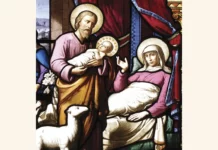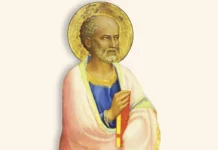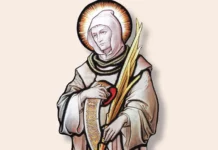His was a life dedicated to evangelization and crowned with a glorious martyrdom. He is an example for Catholics of all times.
The evangelizing epic of the Jesuit missionaries on five continents, and across several centuries, ranks among the most exhilarating sagas of heroism, tenacity, and zeal in the annals of the Church. There seems to be no ocean, desert, forest or plain that the sons of Saint Ignatius of Loyola were unwilling to confront in their quest to save souls.
A giant among them is priest and martyr St. Jean de Brébeuf, venerated among the eight martyrs of North America.
A man “chosen by God”
UBrébeuf was born on March 25, 1593, in Normandy France. He joined the Society of Jesus at age 24, and, in the year 1625, embarked on an enterprise to evangelize the vast North American wilderness. Referring to his dedication and ardour, his religious superior wrote: “Fr. Brébeuf is a man chosen by God for these lands.”
With no other weapon than the Rosary, a small band of missionaries headed by Brébeuf set out over rough terrain on foot, and over the water in agile canoes. Fr. Brébeuf travelled a gruelling thirty days from Québec to reach the land of the Hurons. After manoeuvring the mighty Saint Lawrence River to Montreal, he forded the Ottawa River, to skirt the territory of the Iroquois who were allied with Dutch protestants, enemies of the Catholic Faith. In navigating the turbulent waterways Brébeuf proved himself a master oarsman, as well as a strong and silent expert of the “portage”, whenever it was necessary to disembark and haul everything overland including the canoes.
The Saint cautioned would-be missionaries: “You must expect to be […] in danger fifty times a day of being upset or of being dashed upon the rocks. […] You sometimes ascend five or six rapids in a day; and, in the evening, the only refreshment is a little corn crushed between two stones and cooked in fine clear water; the only bed is the earth, sometimes only the rough, uneven rocks, and usually no roof but the stars.”
Boundless dedication
The tall, strong, magnanimous Fr. Brébeuf always shouldered the hardest tasks. He called himself an “ox”, a play on his surname, but confided in his diary: “To be sure, I was at times so weary that my body could do no more. But at the same time my soul was filled with great happiness as I realized that I was suffering this for God. No one can know this feeling unless he has experienced it.”
Like the Apostle Paul, he made himself “the slave of all” (1 Cor 9:19) among the Hurons. His stamina earned him the nickname “Echon” or “One who carries a heavy burden.” He advised his fellow missionaries that they “must try always to appear cheerful”, and he heroically set the example.
His joy required boundless confidence in God, when, after the first seven years of work, the results were humanly speaking disappointing. He reveals his constrained zeal in this entry in his diary: “О my God, why are you not known? Why is this barbarous country not all converted to you? Why is not sin abolished from it? Why are you not loved? Yes, my God, if all the torments which the captives can endure in these countries in the cruelty of the tortures, were to fall on me, I offer myself thereto with all my heart.”

An offering crowned with martyrdom
God finally reaped this generous offering. In March of 1649, almost a thousand Iroquois warriors, armed with firearms supplied by the Dutch, invaded the mission village of St. Ignace, near present-day Midland, Ontario. The few missionaries and Hurons who escaped massacre were pursued and captured.
Fr. Brébeuf and Fr. Gabriel Lalemant, another saintly Jesuit, evaded the mass slaughter to suffer something more excruciating. Torture began that same day at the hand of the savages, masters of the practice, who burned the missionaries with firebrands and red-hot hatchets, then scalped them, pouring boiling water over their heads, in mockery of holy Baptism. They cut off strips of their flesh, which were roasted and devoured in their sight.
Throughout the ordeal Fr. Brébeuf was primarily concerned with sustaining the natives he had gathered into the fold of the Faith: “My children, remember that God is the witness of our sufferings, and will soon be our exceeding great reward […] sustain with courage the few remaining torments. They will end with our lives. The glory which follows them will never have an end.”
His endurance in torture reached sublime heights. He astonished his executioners, by suffering “like a rock” for three hours. The ferocious savages finally tore out his still pulsing heart, and, with perverse admiration, devoured it, hoping to acquire a portion of his courage.
What profit is there in this blood?
Who won the contest between vicious impiety and saintly valour?
March 16, 1649, marked Fr. Brébeuf’s final triumph. Years previously, he had offered his life on the North American mission field in union with the Precious Blood of Jesus to conquer souls for Holy Mother Church. Mary, Mediatrix of All Graces, gathers and presents to Her Divine Son the sufferings of the martyrs, to obtain graces that make the worldwide work of evangelization fruitful. The blood of the martyrs is always the seed of new Christians.
Despite their evil cunning, the enemies of the Faith hastened the realization of the longing of St. Jean de Brébeuf, expressed in his diary: “I feel an ardent desire to suffer something for Jesus Christ.”
May he help us to be his imitators in bearing witness to the Faith in daily life.







